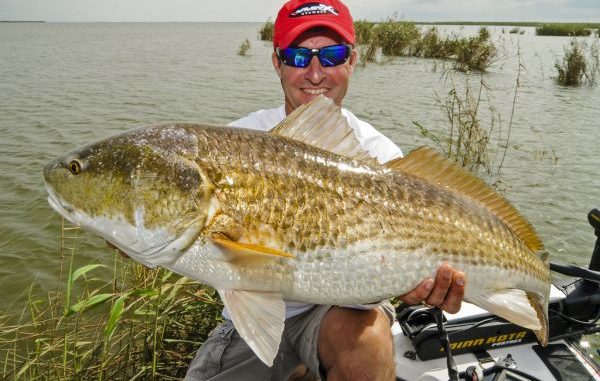
Girth is critical to determining weight without killing fish
The story of the catch and release May 15 of what would almost certainly have been a Louisiana state-record redfish evoked a predictable response on social media — cries that the fish in the photo just couldn’t be big enough to make the record books, much less shatter the current 61-pound state record.
“Looks like a 30- to 35-pound fish,” Facebook fan Murphy Spell said.
Mark Wayne Bussell agreed in his post on the Louisian Sportsman facebook page.
“I got some on my (Facebook page) bigger than that,” Bussell wrote.
The probable record catch outside of Venice’s South Pass was reported by veteran guide Mike Frenette, who tagged the fish at approximately 65 pounds.
“Without a doubt — no question, no hype, no B.S., no nothing — if we would have killed the fish and brought it in, it would be a new state record,” Frenette told Louisiana Sportsman. “The largest (redfish) I’ve ever caught was 58 pounds on a topwater bait, and this fish was bigger than any of those.
“When I saw it first come up to the surface fairly close to the boat, I knew it was a special fish. It’s the first redfish ever — and I release a lot every day — that I couldn’t hold onto it’s tail with one hand. I couldn’t hold on to the base of it’s tail. I had to use two hands just to revive it.”
The formula used to estimate the live weight of a red drum, as stipulated by the South Carolina Department of Natural Resources, is pretty straightforward,. All you have to do is measure the girth at the fattest part of the fish and the length of the fish from the tip of the bottom jaw to the V of the fanned tail, and then plug that information into this forumla:
(Girth x Girth) x Length/800
The resulting number is the estimated weight.
So, let’s apply the formula to the fish caught aboard Frenette’s boat. The redfish measured 53.5 inches long, with a girth of 31.5 inches.
31.5 x 31.5 equals 992.25
Now, multiply that by 53.5 inches (the length), and the result is 53,085.375.
Divide that by 800, and the final number is 66.35671875 pounds.
So Frenette actually underestimated the weight of the fish by about a pound.
